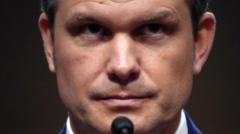In a significant Senate Armed Services Committee hearing, Pete Hegseth, nominated by Donald Trump for the role of Defense Secretary, navigated a challenging landscape of questions regarding his qualifications and past controversies. Despite a lengthy interrogation that included inquiries about sexual assault allegations, views on women in the military, and political experience, he garnered support from Republican senators. This article summarizes five key takeaways from the session, reflecting on Hegseth's military ethos, his contentious views on gender integration in the Armed Forces, his self-portrayal as an agent of change, and criticisms regarding his qualifications and past conduct.
Pete Hegseth's Senate Hearing: A Deep Dive Into Key Moments and Reactions

Pete Hegseth's Senate Hearing: A Deep Dive Into Key Moments and Reactions
During a tense confirmation hearing, Pete Hegseth faced critical questions about his nomination as Defense Secretary amidst accusations and varying viewpoints.
Pete Hegseth approached his Senate confirmation hearing with a strong emphasis on a "warrior culture," asserting his commitment to revitalizing the military's focus on warfighting capabilities. He downplayed concerns over gender and racial diversity initiatives, suggesting they undermine military readiness and morale. In contrast, his Democratic opponents raised pointed questions regarding his controversial remarks about women in combat, demanding clarifications that led to some heated exchanges.
At 44, Hegseth is poised to become one of the youngest Defense Secretaries in history. He characterized his relative inexperience as a potential asset, indicating a desire to disrupt traditional practices in Washington. Some Republican senators echoed this sentiment, branding him a "breath of fresh air." However, Democrats countered this perspective by rigorously questioning his administrative experience, particularly in the oversight of financial and strategic military matters.
Critically, the hearing exhibited a pronounced partisan divide. While Hegseth faced fierce interrogation from Democrats, including Tammy Duckworth and Elizabeth Warren, there was noticeably limited discussion about pressing strategic military challenges such as those posed by China and Russia. Observers, including former defense officials, remarked on the lack of substantive policy dialogue, which they believed impeded a thorough evaluation of Hegseth's competence for the role.
The shadow of past allegations also loomed large over the proceedings, with Hegseth addressing accusations of sexual misconduct made years ago. He framed these controversies as part of a "coordinated smear campaign," invoking his Christian values and notions of personal redemption. Senators raised concerns regarding his responses, questioning the credibility of his claims of reform in light of persistent allegations against him.
As Hegseth moves toward potential confirmation, the discussion surrounding his candidacy underscores significant divisions in American political discourse regarding military leadership and the qualifications necessary to effectively manage the Defense Department.






















